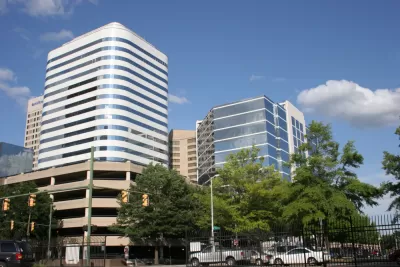The city’s planning commission recommended that the city council eliminate parking mandates that limit housing production and increase housing costs.

The Planning Commission in Richmond, Virginia unanimously approved a proposal to eliminate minimum parking requirements in the city, reports Em Holter in the Richmond Times-Dispatch, joining a growing national movement. “The hope is that, with developers no longer tasked with constructing lots or parking garages, there will be more room to build additional housing units, ultimately increasing the city’s available housing stock.”
Minimum parking requirements, often decided based on unrealistic or arbitrary guidelines, can drive up the cost of housing construction, promote sprawl, and reduce the land available for green spaces. “Often, developers are required to build more parking spaces than there are occupants, which leads to parking lots sitting empty and parking decks left with their higher levels bare.”
Supporters of the proposal say the change would let developers build in accordance with market demand. In Richmond, it seems unlikely that getting rid of parking minimums would lead to a parking shortage. According to Holter, “Over the past five years, the city has approved 50 large-scale residential, commercial and mixed-use projects. In total, the city required 4,789 spaces. The developers provided 12,646.”
FULL STORY: Richmond is one step closer to eliminating parking minimums

Maui's Vacation Rental Debate Turns Ugly
Verbal attacks, misinformation campaigns and fistfights plague a high-stakes debate to convert thousands of vacation rentals into long-term housing.

Planetizen Federal Action Tracker
A weekly monitor of how Trump’s orders and actions are impacting planners and planning in America.

San Francisco Suspends Traffic Calming Amidst Record Deaths
Citing “a challenging fiscal landscape,” the city will cease the program on the heels of 42 traffic deaths, including 24 pedestrians.

Defunct Pittsburgh Power Plant to Become Residential Tower
A decommissioned steam heat plant will be redeveloped into almost 100 affordable housing units.

Trump Prompts Restructuring of Transportation Research Board in “Unprecedented Overreach”
The TRB has eliminated more than half of its committees including those focused on climate, equity, and cities.

Amtrak Rolls Out New Orleans to Alabama “Mardi Gras” Train
The new service will operate morning and evening departures between Mobile and New Orleans.
Urban Design for Planners 1: Software Tools
This six-course series explores essential urban design concepts using open source software and equips planners with the tools they need to participate fully in the urban design process.
Planning for Universal Design
Learn the tools for implementing Universal Design in planning regulations.
Heyer Gruel & Associates PA
JM Goldson LLC
Custer County Colorado
City of Camden Redevelopment Agency
City of Astoria
Transportation Research & Education Center (TREC) at Portland State University
Jefferson Parish Government
Camden Redevelopment Agency
City of Claremont





























